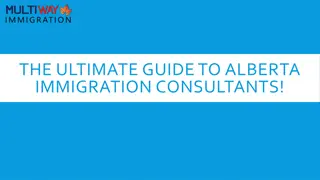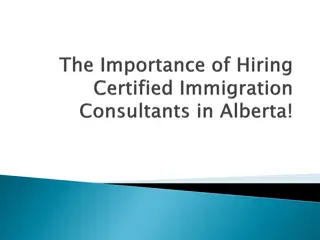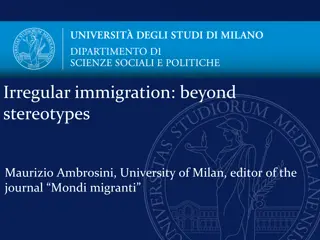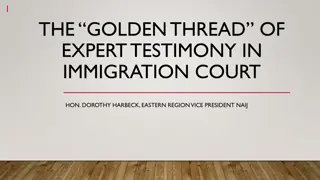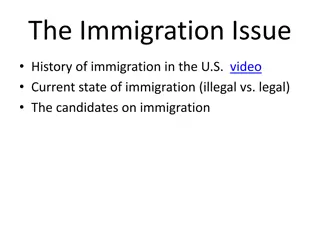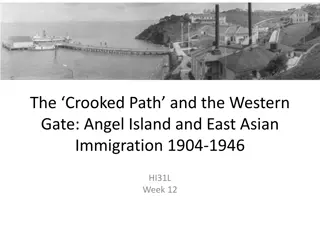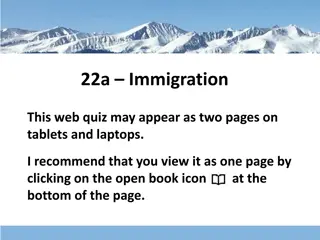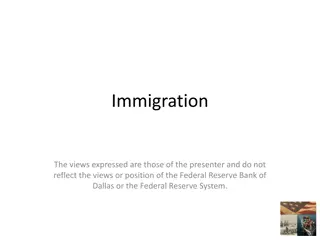Understanding Immigration: Issues and Impacts
Immigration involves the action of permanently moving to a foreign country, while illegal immigration violates immigration laws. Reasons for immigration include economic factors and seeking better opportunities. The ethical considerations of immigration can be analyzed through the lenses of Finnis Natural Law and Hoose's Proportionalism theories.
Download Presentation

Please find below an Image/Link to download the presentation.
The content on the website is provided AS IS for your information and personal use only. It may not be sold, licensed, or shared on other websites without obtaining consent from the author. Download presentation by click this link. If you encounter any issues during the download, it is possible that the publisher has removed the file from their server.
E N D
Presentation Transcript
Title: Finnis Natural Law and Hooses Proportionalism: application of the theory Overview for this section Candidates need to apply the theory they have learnt in sections 2D and 2E to both ethical issues of immigration and capital punishment. A detailed overview of how the various aspects of Finnis Natural Law (with reference to the appropriate elements of the seven basic human goods, the nine requirements of practical reason and the common good) and Hoose s Proportionalism (only breaking a principle if there is a proportionate reason and based on agape love) apply to these two ethical issues is needed. Candidates should focus on the application of the theory to the issues and not on a broad and detailed description of the ethical issues themselves.
Revision deontological, teleological and agape 2D Finnis Natural Law Theory 2 E Hoose s Proportionalism Write a sentence to explain natural law using the words; Aquinas, eternal, reason, God, re-establish and purpose. What is the difference between practical and theoretical reason? What did Finnis mean by self- evident? What seven basic goods did Finnis identify? L, K, F, P, A, P, R What are the nine requirements of practical reason? Whole life, no arbitrary preferences between values and people, detachment, commitment, efficiency, do good, community and conscience Why did Proportionalism develop? How can Aquinas Natural Law be said to have some proportionalist ideas and also to oppose it? What is Proportionalism? Complete this quote from Hoose It is never right to go against a principle unless . . . What are pre-moral, ontic or physical acts and why are they relevant to Proportionalism? Why are value, disvalue, right act and good act key concepts for Proportionalists? How can Proportionalism be compared to Situation Ethics?
Immigration What is it? Why would people immigrate? What could be some of the issues arising from immigration? What reasons can you give for immigration being a good thing? What reasons can you give for immigration being a bad thing?
What is it? Immigration the action of coming to live permanently in a foreign country. Emigration the act of leaving one's own country to settle permanently in another; moving abroad. The difference between immigrate and emigrate is immigrating is the act of entering a foreign country to live while emigrating is the act of leaving a country to live in another.
Illegal immigration (also referred to unauthorized or undocumented immigrants) the migration of people across national borders in a way that violates the immigration laws of the destined country
Why would people immigrate? Push factors Economic No work No resources Poor education Services that provide a longer life expectancy and life opportunities Weak infrastructure Poverty (LEDCs) Political Government opposed to your views Dictators Seeking refuge or asylum from conflict or persecution Pull Factors Economic More jobs Resources Free and effective education Medical care High Standard of living (MEDCs) Political Freedom of beliefs and actions Democracy that allows your views to be aired A country with a good record of Human Rights or one free of conflict
Why would people immigrate? Push factors Environmental Current flooding, droughts, earthquakes etc High risk of natural disasters in the future (unstable) A climate inappropriate for growing food A climate inappropriate for growing goods to export Pull Factors Environmental No current natural disasters o Stable environment with low future risks o A climate that allows food to grow A climate appropriate for growing goods to export o o
Issues Illegal Immigration Risking life to move What is the action that is the least risky ? Breaking the law Should the law be kept in this case? If it damages pursuits of the Basic Goods (Finnis), or creates disproportionate results in terms of agape (Hoose) is it a law we should adhere to? Funding criminal gangs to move Can this sort of migration ever be moral?
Issues legal Immigration Changes in demographic and culture Are we undermining Basic Goods by allowing this? Is this proportionate in terms of agape? Migrant crises for the countries receiving the immigrants? Economic consequences Problems with demands on infrastructure Public services: transport, education, housing, healthcare Are we undermining Basic Goods in this way? Is this proportionate in terms of agape?
Theme 2F: Applying Finnis Natural Law to Immigration Questions for this lesson How do the seven basic human goods apply to immigration? How do the Nine Requirements of Practical Reason apply to immigration? How does the Common Good apply to immigration? Starter: Consider the previous discussions, do you think Finnis Natural Law would say immigration is a moral act?
Starter Finnis Natural Law would justify immigration. DISAGREE AGREE
Make notes on the following: Why should we welcome immigration? https://www.youtube.com/watch?v=LPjzf GChGlE https://www.youtube.com/watch?v=Y1sdI HbkHEw https://www.youtube.com/watch?v=7oOm A09unRM
Case Study: Migration from Sub-Saharan Africa to Europe
Task: Use your notes to explain how Finnis seven Basic Goods, and Nine Requirements of Practical Reasonableness would mean immigration is moral and should be allowed
Make notes on the following: Why should we not welcome immigration? https://www.youtube.com/watch?v=LPjzf GChGlE https://www.youtube.com/watch?v=1ehG hwfd4sM https://www.youtube.com/watch?v=fWTO aYKp-Aw
Task: Use your notes to explain how Finnis seven Basic Goods, and Nine Requirements of Practical Reasonableness would mean immigration is immoral and should not be allowed and how it could be used to show immigration is moral and should be allowed
Do you still think the same? Finnis Natural Law would justify immigration. DISAGREE AGREE
Finnis Natural Law Finnis disagrees with immigration or the lack of controls on immigration. Finnis warns about the imminent demise of (European, Anglo-American) civilization posed by the aliens at the gates, people immigrating from other countries with other cultures and social norms He thinks Western societies are quickly going to pot, and he lays some of the blame for this on loose immigration policies. Remember at AO2 you will get an opportunity to explain challenges to his views
Finnis Natural Law European states in the early twenty-first century move ever more clearly out of the social and political conditions of the 1960s into a trajectory of demographic and cultural decay, circumscription of political, religious and educational speech and associated freedoms; pervasive untruthfulness about equality and diversity; population transfer and replacement by a kind of reverse colonization; and resultant international fissiparation foreshadowing, it seems, ethnic and religious inter-communal miseries of hatred, bloodshed and political paralysis reminiscent of late twentieth century Yugoslavia s or the Levant s. John Finnis from his essay on the political philosophy of H.L.A. Hart
How is Finnis applying his Seven Basic Goods and Nine Requirements of Practical Reasonableness in order to show that FREE immigration should not be allowed?
Theme 2F:Applying Hooses Proportionalism to immigration Questions for this lesson How does Hoose s proportionalism apply to immigration? Starter: Do you think Hoose s Proportionalism would say immigration is a moral act?
Starter Hoose s Proportionalism would justify immigration. DISAGREE AGREE
What are the costs and benefits of immigration https://www.youtube.com/watch?v=by2 dTCj-qdk
Proportionalism Immigration does allow for some of the ontic (real) goods qualities such as dignity, integrity and justice which themselves are not moral but are desirable qualities and should be taken into account when making a moral decision. However, if immigration can cause harm to others, as we have seen Finnis has tried to show, it could not be justified. All possible consequences need to be considered to decide whether or not it can be justified.
Task Apply the principles of proportionalism and agape to immigration
Exam question Explain how Finnis Natural Law would apply to immigration [20] Is this AO1 or AO2? What must you do? Plan your DISS











